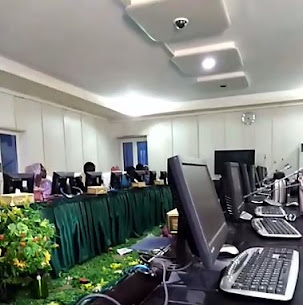Zoom seminar reaches, energizes 255 Sudanese journalists
I’ve given perhaps a hundred peace journalism seminars and workshops in 27 countries around the world. The seminar I presented for Sudanese journalists last week, sponsored by the U.S. Embassy and U.S. State Dept., was perhaps the most interesting, and definitely the most unique.
First, the three day workshop was presented entirely via Zoom. Secondly, the seminar set a record for the largest single peace journalism seminar with 255 participants from 15 of the 18 regions of Sudan. The participant-journalists were mostly gathered at universities. And third, despite the size and virtual nature of the seminar, the participants were unusually eager to share their viewpoints and experiences.
The first day of the seminar featured an introduction to peace journalism. I led a discussion about what responsible journalism should do, and should look like, in Sudan. Several participants discussed the importance of freedom of the press as a prerequisite to improving journalism, and hoped that the 2019 revolution will pave the way for expanded press freedoms. There is still substantial improvement needed in this area, however. Human Rights Watch and others have reported on recent efforts by the army to threaten and muzzle critical journalists using the same anti-freedom laws wielded by the previous autocratic Sudanese regime.
Several other journalists mentioned the important role journalism should play in “celebrating diversity” and rejecting traditional “us vs. them” narratives, one of the cornerstones of peace journalism. Others still emphasized the importance of being unbiased, and that this is especially important in reporting about other ethnic groups.
The most interesting question of the day was whether it is okay for journalists to exaggerate a story if this exaggeration would create greater awareness of a vitally important issue. My response invoked “the boy who cried wolf.” What happens, I asked, when there is a story of great importance? Will the public think we’re exaggerating it? Every time we exaggerate and sensationalize, we lose our credibility, I noted.
On day two, we discussed social media and its central role in the revolution. One participant said that using social media, “People promoting the revolution were guiding the narrative…They were aware of what was happening in real spaces. They conveyed the information. Traditional journalism was limited by the security apparatus and couldn’t participate as fully as they would have liked.”
We also discussed the central role of media in reconciliation processes. Journalists from Gedarif University said in the chat room, “The media has a vanguard role in resolving conflicts and ethnic and racial differences by proposing continuous awareness programs to leave differences and look to the future of the specific region to achieve security and peace through coexistence and acceptance of the other, as well as producing interactive programs for the local community on conflicts and disagreements that divide society.”
There were also many interesting interactions during the third and final day of the seminar.
We discussed coverage of the conflict in Darfur. One participant said that the coverage was completely biased, and hindered by multiple obstacles. “Journalists tried to highlight events, but were coerced (by authorities) to highlight alternative narratives and forced to show a state narrative,” she said.
“We couldn’t maintain neutrality,” said another journalist. There were ethnic cleavages, but journalists were “not able to cover them adequately.”
In terms of reporting about the civic unrest that led to the overthrow of the Bashir regime in 2019, journalists noted that “official media was very limited and diminished in its capacity…to convey demands of the people.” Others agreed, noting that the State acted “with a fist of iron.” Those who spoke agreed that social media was best able to present the news and the “peaceful nature of the revolution.”
The seminar was made possible by the civilian-led transitional government (CLTG) and the United States Embassy, which share a “ number one priority to establish peace” in Sudan, according to Public Affairs Officer Keith Hughes. Since Covid -19 made my travel impossible, the decision was made to hold the seminars virtually. Further, holding the seminar required the State Dept. and CLTG to convince Zoom executives to life the block on Sudanese IP addresses using Zoom.
It is my plan to make a face to face visit to Sudan to continue our discussions about peace journalism sometime in 2021—inshallah, as they say in Arabic.




0 comments:
Post a Comment